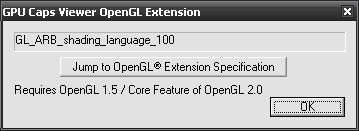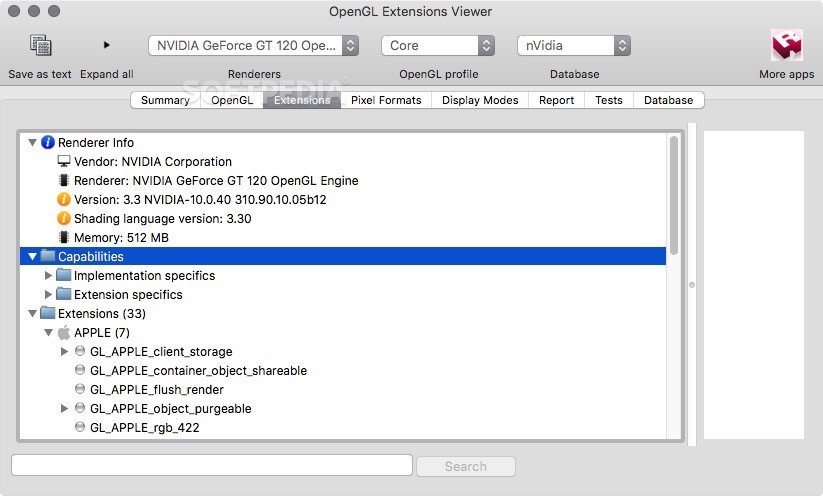
- #OPENGL EXTENSIONS VIEWER MULTIPLE CARDS DRIVERS#
- #OPENGL EXTENSIONS VIEWER MULTIPLE CARDS DRIVER#
- #OPENGL EXTENSIONS VIEWER MULTIPLE CARDS FOR ANDROID#
- #OPENGL EXTENSIONS VIEWER MULTIPLE CARDS FREE#
- #OPENGL EXTENSIONS VIEWER MULTIPLE CARDS WINDOWS#
#OPENGL EXTENSIONS VIEWER MULTIPLE CARDS WINDOWS#
GPU Caps Viewer in action under Windows Vista - Flip 3D RivaTuner Monitoring: on a GeForce GTX 280, the temperature went up from 50☌ (idle) to 90☌ using the Fur Stress Test! OpenGL Demo - Vertex Texture Fetching (VTF) Demo GPU Stress Test - Fur Demo - Useful to heat up the GPU as hell! For gpu-overclockers. OpenGL 3 + OpenCL - Surface deformer demo OpenGL 3 + OpenCL - 1,000,000 Particles demo OpenGL 3 + OpenCL - Ray Traced Quaternion Julia 4D You have the possibilty to export the report to a conveniant XML file. You can jump directly to the extension page at the OpenGL Extension Registry.įull report. You can use that validation in benchmarks or to help graphics applications developers to solve specific problems.

Of the customer graphics system (for support purposes for example). This kind of report is useful for developers who needs an outline

#OPENGL EXTENSIONS VIEWER MULTIPLE CARDS DRIVERS#
list of links related to your graphics card: graphics drivers and graphics cards reviews.You can start several stress test demos in the same time in order to make your graphics card working to the maximum. GPU Burner or Stability Test: allows to overheat the GPU in order to test the graphics card.display of the system configuration: CPU type and speed, amount of systeme memory, operating system, PhysX version.The OpenGL Extension Registry or at NVIDIA's OpenGL Extensions spec. For each extension, you can open its description webpage available at OpenGL extensions no matter what graphics card you have. display of the OpenGL extensions supported by your graphics card or display of all existing.display of OpenCL API support and extensions.display of the main OpenGL capabilities (OpenGL version, texture size, number of texture units, etc.).quick view of the graphics configuration (graphics card / GPU type, amount of video memory, drivers version).

GPU Caps Viewer is an OpenGL and OpenCL graphics card utility for Windows XP and Vista (32/64-bit). GPU Caps Viewer 1.55.0.0 - WinXP / Vista / Win7įor any bug report, feedback or whatever else about GPU Caps Viewer, please use the forum: What is GPU Caps Viewer ? >GPU Memory Speed Demystified >Multi-Threading Programming Resources >GeForce and Radeon OpenCL Overview >How to Get your Multi-core CPU Busy at 100% >How To Make a VGA Dummy Plug >Night Vision Post Processing FilterĬurrent version: 1.5.4 >FluidMark homepageĬurrent version: 0.3.0 >TessMark homepageĬurrent version: 0.3.0 >ShaderToyMark homepage >ShaderToyMark Scores
#OPENGL EXTENSIONS VIEWER MULTIPLE CARDS FOR ANDROID#
Combined Vulkan and OpenGL ES listing for android.OpenGL Hardware Capability Viewer 1.2 released.Reworked compare functionality for all GPU databases.Recent versions of the glCapsViewer are built using C++ and the Qt framework for the cross-platform UI. The sources for project are open source and hosted at github. The latest binaries for Windows and Linux can be found at.
#OPENGL EXTENSIONS VIEWER MULTIPLE CARDS DRIVER#
check what has changed between two driver versions or how two graphics cards differ in terms of their OpenGL implementation.

The database itself allows for advanced searches (extensions, compressed texture formats, capabilities), and can compare different device reports, so you can e.g. DatabaseĪlong with the client-side application, there is also an online database containing all OpenGL hardware reports uploaded by users of this application.
#OPENGL EXTENSIONS VIEWER MULTIPLE CARDS FREE#
The early versions of this tool were developed using Delphi / Free Pascal, but the project has since then been redone in C++ is available for multiple platforms. The “OpenGL hardware capability viewer” (short “glCapsViewer) a multi-platform client-side application that reads out all important hardware capabilities of the current OpenGL-implementation present on your system (currently up to OpenGL 4.5), that can then be uploaded to a public database, serving as a tool for OpenGL developers.


 0 kommentar(er)
0 kommentar(er)
